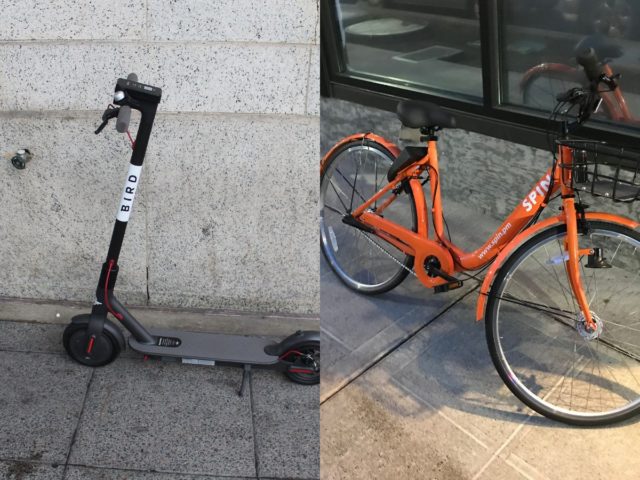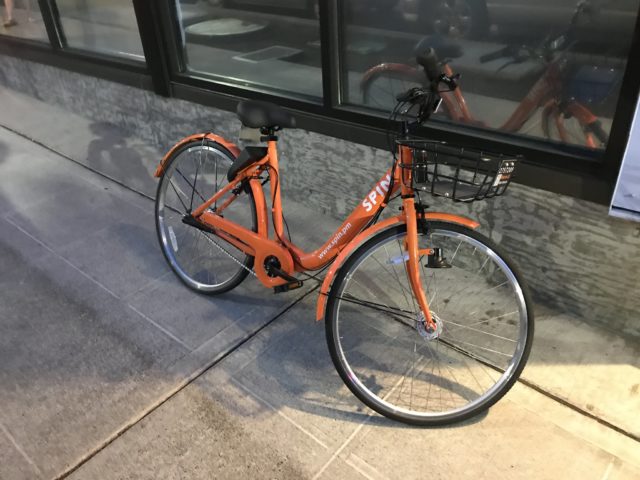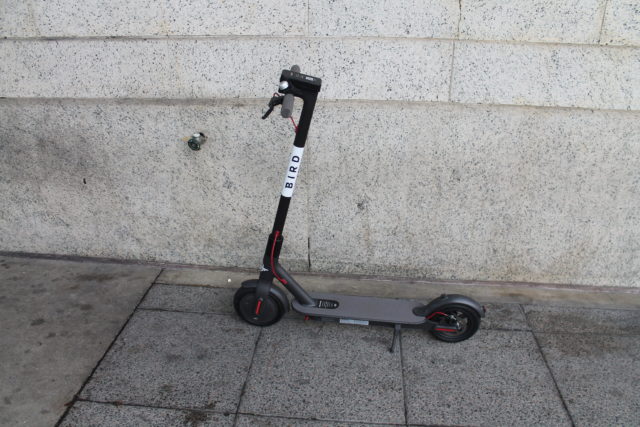Equity Program Scan Part 4: Spin & Bird
by Farrah Daniel, Better Bike Share Partnership Writer
April 27, 2020

Note: This series does not include a COVID-19 update.
Private companies have long invested significant amounts of stock in the shared micromobility landscape. While the coexistence of traditional and private companies has both ups and downs, is equity compromised by the goal to turn a profit?
In 2017, the Bureau of Transportation reported that households spent an average of $9,737 on transportation. Rural households, on the other hand, spent $10,293 compared to urban household’s $9,511.
The reality is millions of people can’t support these skyrocketing transportation costs. Creating accessible and equitable bike share programs means lower-income residents don’t have to pay a higher percentage of their income than financially stable people, and don’t have to jump through dozens of hoops to access this basic human right.
Portland State University’s Transportation Research and Education Center’s (TREC) 2019 research report compared equity-oriented programs across five bike share systems and measured program effectiveness on hiring practices, having electric bicycles, employee training, having an income-based discount, having an adaptive cycle program, and having a cash payment program.
Areas of improvement included marketing campaigns, transit integration, non-English offerings, and service area boundaries.
How might shared micromobilty companies meet some of these standards? In this series of four posts, we lay out the details of the equity-based programs offered by JUMP, Spin, Bird, Lime and Lyft.
In the fourth part of this equity program series, we’re covering two operators that have quickly taken over popularized cities with their e-scooters: Spin and Bird.
Q&A With Spin
 Photo courtesy of Spin.
Photo courtesy of Spin.
Beaudry Kock, Head of Policy Initiatives, and Alex April, one of Spin’s government partnerships managers with special expertise and interest in diversity, equity and inclusion chimed in to discuss the operator’s equity initiatives now and in the future:
1. How is (your company) currently prioritizing equity and access?
We maintain a low-income and non-smartphone, underbanked user program, Spin Access. The program is designed to provide discounted rides as well as additional means to access and unlock scooters (e.g. via SMS). It operates in 34 markets.
We acknowledge that the program is not all it could be, so we launched a re-design effort late last year in partnership with D-Ford (Ford’s human-centered design innovation team), Gehl, TransForm, and Toole Design. We will be rolling out a transformed program later this year that better meets the needs of diverse users. We are in the process of raising the profile of this program internally, and making the case for equity as essential to the success of the business long term, as well as simply being the right thing to do.
2. How do you plan to improve or make your equity programs more available in 2020?
See the above note on the re-design effort we’ve launched which will complete next quarter.
3. How many people access your equity programs / what are the top markets?
Around 1,000 people across our 34 Spin Access markets have applied to join the program. The numbers are unacceptably low, which is why we are investing extensively in rethinking the program and expanding its offerings in 2020. Top markets include San Francisco, D.C., Portland, and Los Angeles.
4. How does your company address diversity in the workplace?
Currently, we have a Diversity and Inclusivity (D&I) team at Spin with over 20 members working to make Spin a place where all employees regardless of background, department, or location have a sense of belonging. The D&I team will actually be meeting [soon] to set goals and benchmarks for the company. We currently have ERGs (Employee Resource Groups) and will be looking to create more this quarter to support employees.
Spin Access
Spin was founded in San Francisco in 2016 and operates dockless mobility systems in cities and campuses throughout the United States. When its Spin Access program began shortly after, the purpose was to reach more people and offer solutions for those who have:
- No smartphone and no credit card
- No smartphone, but have a credit card
- No credit card, but have a smartphone
Though Spin Access is available in 34 markets, in-person locations are only available in Chicago, IL; Washington, D.C.; Los Angeles, CA, Portland, OR; and Winston-Salem, NC. Transactions are cash only, with the exception of the Portland office, which accepts credit cards.
Outside of Spin’s equity program, it has also decided to provide six nonprofits with access to a street data toolkit to allow each organization to contribute solutions to city infrastructure and safety changes.
Rates may vary by market, but most Spin Access members will receive the following pricing:
| Cities | Cost | Cash payment | Eligibility |
|---|---|---|---|
| Alexandria, Arlington, Asbury Park (NJ), Athens (OH), Austin, Baltimore, Cleveland, Columbus, Coral Gables (FL), Denver, Detroit, Durham (NC), Fayetteville (AR), Kansas City, Memphis, Miami, Milwaukee, Minneapolis, Nashville, Phoenix, Portland, Providence, Sacramento, Salt Lake City, San Antonio, San Diego, San Jose, St. Louis, West Lafayette (IN), Winston Salem (NC) |
|
Yes | You may submit any document or card that verifies your enrollment in a local, state, or federal program for which low-income status is required (e.g. Medicaid, LIHEAP, SNAP, WIC, EBT, etc). |
| Los Angeles, San Francisco, and Washington D.C. |
|
Yes | You may submit any document or card that verifies your enrollment in a local, state, or federal program for which low-income status is required (e.g. Medicaid, LIHEAP, SNAP, WIC, EBT, etc). |
— — —
Let’s move on to Bird.
 Photo courtesy of Elvert Barnes
Photo courtesy of Elvert Barnes
Founded in 2017 in Santa Monica, Bird has rapidly expanded despite weathering some fiscal issues in 2019. The scooter startup announced the One Bird equity program in 2018 to make rides more accessible for underserved communities and promote transit equity.
Recently, Bird has spent quite some time in the headlines with news of massive layoffs quickly taking off.
Q&A With Bird
Despite the storms the operator is facing, Jasmine Wallsmith, part of Bird’s marketing and communications team, shared a bit of insight in future plans and how they include underserved communities.
1. How is (your company) currently prioritizing equity and access?
Bird is committed to addressing equity issues and utilizing our scooter service to expand mobility options for people facing financial or technological barriers. We believe in the power of reliable, low-cost transportation alternatives. Our low-income plan and community engagement efforts are focused on increasing mobility options for everyone.
2. How do you plan to improve or make your equity programs more available in 2020?
We advertise our equity program online, through social media, at events (when permitted), and through print flyers, to ensure that low-income communities are aware of Bird Access. Additionally, we provide our materials in Spanish and other languages, depending on the market, to ensure that Bird Access reaches non-English speaking audiences.
3. How many people access your equity programs / what are the top markets?
In the future, depending on the market, we are looking to expand the pool of eligible riders for our access plan to include non-governmental organizations, educators and students, first responders and/or healthcare workers.
4. How does your company address diversity in the workplace?
An example of a top city for our access program is San Francisco. In SF, the program is called the Community Plan and has more than 1, 000 members. You can learn more about that here.
In 2020, Bird joined PledgeLA, which is a first-of-its-kind coalition between local government, the Annenberg Foundation, venture capitalists and tech leaders. By taking the Pledge, Bird commits to increasing our community engagement, improving diversity, equity and inclusion, and reporting our progress annually. This new initiative seeks to establish a progressive tech community that is representative of diverse backgrounds and experiences to foster positive innovations throughout the industry. You can read more here.
Bird Access
Now called Bird Access, the low-income scooter share program offers unlimited rides to low-income residents for $5 a month (prices may vary by city and program). Riders can also pay with cash and unlock vehicles via SMS.
Available now in all cities where Bird operates, Bird Access eliminates the $1 base fee per ride for anyone who is currently enrolled in, or eligible for a state or federal assistance program. Waiving the base ride fee means that eligible riders can ride Bird for 15 cents per minute.
Rates vary by city:
| Cities | Cost | Cash payment | Eligibility |
|---|---|---|---|
| Alexandria (MD), Arlington, Atlanta, Austin, Bakersfield (CA), Bloomington (IN), Boise, Brookline (MA), Charlotte, Cincinnati, Cleveland, Columbia (MO), Columbus, Coral Gables, Culver City, Dallas, Denver, Detroit, Durham, Fairfax (VA), Fort Collins (CO), Ft. Lauderdale, Harrisonburg (VA), Indianapolis, Kansas City, Long Beach, Los Angeles, Louisville (KY) Memphis, Meridian (ID), Miami, Milwaukee, Montgomery County (MD), Nashville, Norman (OK), Oakland, Phoenix, Portland, Richmond, Salt Lake City, San Diego, San Francisco, San Jose, Santa Monica, Scottsdale (AZ), St. Louis, Tallahassee, Tampa, Tempe (AZ), Tucson (AZ), Tulsa, Virginia Beach, Washington DC |
|
Yes, with Scoot | Low-income riders who are enrolled or eligible for a government assistance program:
|
Several attempts to get more details from both Spin and Bird’s teams were unsuccessful, so don’t hesitate to reach out if there’s any information missing!
— — — —
Thank you for reading our latest series!
Catch up with the previous posts in this series:
The Better Bike Share Partnership is a JPB Foundation-funded collaboration between the City of Philadelphia, the Bicycle Coalition of Greater Philadelphia, the National Association of City Transportation Officials (NACTO) and the PeopleForBikes Foundation to build equitable and replicable bike share systems. Follow us on Facebook, Twitter and Instagram or sign up for our weekly newsletter. Story tip? Write farrah@peopleforbikes.org
